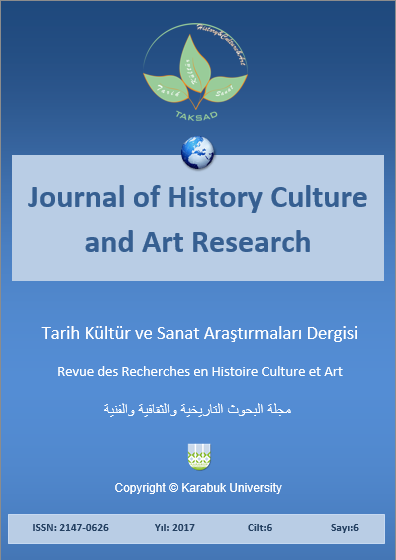The Role of Linguo-Cultural Dictionaries in the Process of Language Leaners’ Values Formation
DOI:
https://doi.org/10.7596/taksad.v6i6.1337Keywords:
Student, Learning, Linguistics, Vocabulary, Value, Socio-cultural community.Abstract
At the present time the foreign language is not only a means of communication for full-fledged rendering of thoughts expressed in another language, but also the guide in the perception of the definite set of values. The study of foreign languages is a targeted process for the development of universal spiritual values and achievements of the world culture, ensuring the development of the intellectual and emotional sphere of the individual. Linguistic-cultural dictionaries can be considered as one of values formation sources. The purpose of this article is to examine the process of value formation in its orientation to the linguistic consciousness of members of a certain socio-cultural community as a basis for linguistic-cultural dictionaries. This intends study of the dependence of values of lexical units from the corresponding normative value system of nation representatives. The installation on the interpretation of strange, unknown culture is fundamentally different from the understanding of the phenomena during the communication. So the fragments of foreign culture are learned by transferring from one normative value system to another. Here we can observe the process of defamiliarization - the identification of unexpected, strange in comparison with the usual ways of the world discovery together with the identification of an unknown, unfamiliar with a known, traditional.
References
Bondarenko, A. V. (1987). Grammatical meaning and meaning. Leningrad: Nauka.
Chernov, G. V. (1996). America: English-Russian linguistic-cultural dictionary. Moscow: Poligram.
Denisova, M. A. (1978). Linguistic-cultural dictionary. Public education in the USSR. Moscow: Rus. Yaz.
Denisova, M. A. (1983). Linguistic-cultural dictionary (2nd ed.). Moscow: Rus. Yaz.
Felitsyna, V. P. & Prokhorov, Yu. E. (1979). Russian proverbs, sayings and winged expressions: Linguistic-cultural dictionary. Moscow.
Gusev, S. S. & Tulchinsky, G. L. (1985). The problem of understanding in philosophy. Moscow: Politizdat.
Karpova, O. M. & Kartashkova, F. I. (2014). Multi-disciplinary Lexicography: Traditions and Challenges of the XXIst Century. Cambridge Scholars Publishing.
Korotaeva, I. E. (2003). A brief English-Russian linguistic and cultural thematic dictionary "US Road Transport". Moscow: Sputnik.
Kosyreva, O. A. (2003). A short English-Russian linguistic and cultural thematic dictionary "Home / Housing". Moscow: Izd-vo MGOU.
Leontiev, A. A. (1965). A word in speech activity. Moscow: Nauka.
Longman Dictionary of English Language and Culture (1992). Longman House. Oxford.
Lotman, Yu. M. (1992). Culture and Explosion. Moscow: Progress.
Markaryan, E. S. (1983). The theory of culture and modern science. Moscow: Misl’.
Melnikov, G. P. (1971). Semantics and problems of Turkic studies. Soviet Turkology Journal, 6.
Oschepkova, V. V. (1983). Some Anglo-American parallels of key concepts related to the education system. Linguistic-cultural edition of English lexics: Sb. Sci. Works, (pp. 42-47). Moscow. MGPI.
Oschepkova, V. V. (2006). Language and culture of Great Britain, USA, Canada, Australia, New Zealand. Moscow: St. Petersburg: GLOSSA.
Oschepkova, V. V. & Petrikovskaya, A. S. (1998). Australia and New Zealand. Lingvostranovedchesky dictionary. Moscow: Rus.Yaz.
Oschepkova, V. V. & Shustilova, I. A. (2001). Short English-Russian linguistic and cultural dictionary: Great Britain, USA, Canada, Australia, New Zealand. Moscow: Flint.
Oxford American Dictionary (2008). OUP. Oxford.
Paliy, V. F. & Shcherbina, V. F. (1980). Dialectics of the spiritual and practical mastery of nature. Leningrad: Nauka.
Petrov, V. M. (1981). Value aspects of science and the problems of ecology. Moscow.
Rum, A. R. C.; Kolesnikova, L. V. & Pasechnik, T. A. (1978). Great Britain. Linsh is a regional dictionary. Moscow: Rus. Yaz.
Rum, A. R. W. (2000). Great Britain: Linguistic and Cultural Dictionary (2nd ed.). The stereotype. Moscow: Rus. Yaz.
Slyusareva, N. A. (1963). Sense as extralinguistic phenomenon. In: How to prepare an interesting lesson of a foreign language. Moscow: Nauka.
Ter-Minasova, S. G. (2008). Language and crosscultural communication. Мoscow: Word.
Tomakhin, G. D. (1999). USA. Linguistic-cultural dictionary. Moscow: Rus. Yaz.
Tulchinsky, G. L. (1980). To streamline interdisciplinary terminology: the genesis and development of the term "alienation". In: Psychology of the processes of artistic creation, (pp. 241-245). Leningrad: Nauka.
Ushakov, D. N. (2008). Explanatory Dictionary of the Russian Language. Moscow: AST.
Vereshchagin, E. M. & Kostomarov, V. G. (1990). Language and culture. Linguistic-cultural science in teaching Russian as a foreign language. Moscow: Rus. Yaz.
Downloads
Published
How to Cite
Issue
Section
License
All papers licensed under Creative Commons 4.0 CC-BY.- Share — copy and redistribute the material in any medium or format
- Adapt — remix, transform, and build upon the material for any purpose, even commercially.
Under the following terms:
Attribution — You must give appropriate credit, provide a link to the license, and indicate if changes were made. You may do so in any reasonable manner, but not in any way that suggests the licensor endorses you or your use.
- No additional restrictions — You may not apply legal terms or technological measures that legally restrict others from doing anything the license permits.







